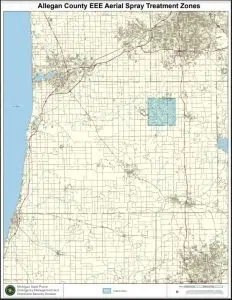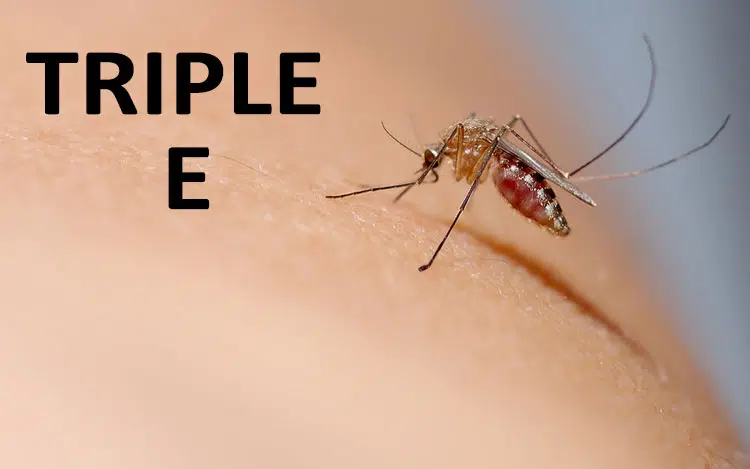ALLEGAN, MI (WKZO AM/FM) — Health officials in Allegan say that the area in Dorr Township is scheduled for aerial spraying tonight, September 21, as weather permits.
As of September 21, officials say there have been 31 cases of eastern equine encephalitis (EEE) in animals across Michigan, with one confirmed deer in Allegan County. Additional animal cases are currently under investigation.
Currently, there is one confirmed human case of EEE in Barry County.
The Michigan Department of Health and Human Services (MDHHS) has scheduled a mosquito control treatment in an Allegan County area (a 5-mile radius from where the EEE positive deer was found) for this evening.
See the attached map for the 13-1 block spraying area.
Aerial spraying is completed by a low-flying aircraft, beginning at dusk and continuing until 4:30 a.m. the next morning. Mosquito control professionals will apply approved pesticides as an ultra-low volume (ULV) spray. ULV sprayers dispense very fine aerosol droplets that stay suspended in the air and kill adult mosquitoes on contact.

The highlighted area of Dorr Township in the Allegan area will be sprayed for mosquitoes on the evening of September 21, 2020. (Photo courtesy of the Allegan County Health Department)
The product being used is called Merus 3.0. It is an EPA-registered, botanical adult mosquito insecticide, Organic Materials Review Institute (OMRI) listed and can be used around organic crops and gardens.
It may be used in certified organic production or food processing and handling, according to the United States Department of Agriculture (USDA) National Organic Program regulations.
Mosquitoes are present and will remain active until there is a hard freeze, meaning when the temperature drops below 28 degrees for an extended period of time. Due to the need for expedition, the Michigan Department of Agriculture and Rural Development (MDARD) has issued an emergency rule temporarily amending the rule for notification and participation for community pesticide applications for aerial treatment across affected counties.
ACHD wants to remind residents that infections can happen, even when mosquito bite numbers are low. Avoid mosquito bites and the diseases they carry with these steps:
- Limit outdoor activity between dusk and dawn when the mosquito types that carries EEE is most active;
- Apply insect repellents that contain the active ingredient DEET, or other U.S. Environmental Protection Agency registered product to exposed skin or clothing, and always follow the manufacturer’s directions for use;
- Wear long-sleeved shirts and long pants when outdoors and apply insect repellent to clothing;
- Empty water from mosquito breeding sites around the home, such as buckets, unused kiddie pools, old tires or similar sites where mosquitoes may lay eggs;
- Use nets and/or fans over outdoor eating areas.
Persons younger than age 15 and over age 50 are at greatest risk of severe disease if infected. Signs of EEE include the sudden onset of fever, chills, body and joint aches that can progress to a severe encephalitis, resulting in headache, disorientation, tremors, seizures and paralysis.
Permanent brain damage, coma and death may also occur in some cases. Anyone experiencing these symptoms should visit their physician’s office.
For more information on EEE and other mosquito-borne diseases, visit www.michigan.gov/emergingdiseases.
Visit www.michigan.gov/EEE for all aerial spraying maps, areas completed, spraying schedules, and MDHHS previous news releases.









Comments